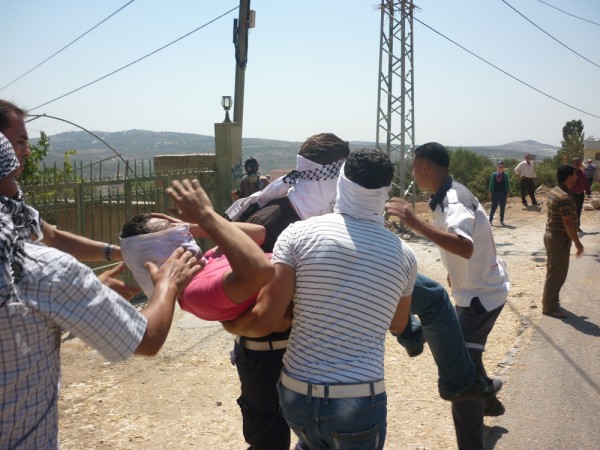13 arrested, beaten during Kufr Qaddoum protest in West Bank
 Sunday, August 19, 2012 at 10:01PM
Sunday, August 19, 2012 at 10:01PM By The Popular Struggle Coordination Committee
By +972blog Published August 18, 2012
http://972mag.com/13-arrested-beaten-during-kufr-qaddoum-demonstration-in-west-bank/53196/
Some two hundred and fifty residents of Kufr Qaddoum, joined by a handful of Israeli and international activists, protested in the village on Friday against the enclosure of the village and an ongoing land grab policy. The protest was launched in a cheerful march from the center of the village towards the main road, which was blocked by the army a few months ago. As protesters came close to the barrier, Israeli forces began shooting large quantities of tear-gas canisters, as well as rubber-coated bullets.

After about half an hour of protest and without any warning, an army bulldozer cleared the road and made way for military jeeps and dozens of soldiers who began storming into the village. The army instantly arrested six Palestinians – among them four journalists – three Israelis and four international activists. Some of the arrestees were severely beaten. One journalist’s leg and another’s arm were broken during their violent arrests. The Israelis, internationals and journalists were released after short investigations. However, two local youth currently remain in custody. Both were taken to the Hawara detention center where they can be kept for eight days before being brought before a judge.
(Video depicts violent arrests of several journalists)
Kufr Qaddoum, a small town of 3,500 inhabitants, is situated in the northern West Bank, between Nablus and Qalqilya. Qaddum’s total land area used to consist of nearly 19,000 dunams, of which 11,000 are now under total Israeli control. Village lands have been repeatedly confiscated to build and expand the settlement of Kedumim. The expansion of one the settlement’s neighborhoods, Mitzpe Yishai, became relatively well-known when even the Israeli Civil Administration described land takeover as theft. Lands that were officially recognized as belonging to private owners in Qaddoum were taken over in an orderly manner, without any official authorization. Furthermore, the village has been effectively besieged since the beginning of the second intifada, when the main and only entrance to the village was blocked by the army.
---------------------------------------------------------------------------------------------------
Court case reveals how settlers illegally grab West Bank lands
Methods used by Jewish settlers to take over private Palestinian land are made public for the first time
http://www.haaretz.com/news/court-case-reveals-how-settlers-illegally-grab-west-bank-lands-1.241487
By Meron Rapoport Haaretz 17 March 2008
West Bank settlements have expanded their jurisdictions by taking control of private Palestinian land and allocating it to settlers. The land takeover - which the Civil Administration calls "theft" - has occured in an orderly manner, without any official authorization.
The method of taking over land is being publicized for the first time, based on testimony from a hearing on an appeal filed by a Kedumim resident, Michael Lesence, against a Civil Administration order to vacate 35 dunams (almost 9 acres) near the Mitzpe Yishai neighborhood of the settlement. Official records show the land as belonging to Palestinians from Kafr Qaddum.
Lesence's lawyer, Doron Nir Zvi, admitted at the hearing that the land in question was private Palestinian property. However, Lesence claims ownership on the grounds that he has been working the land for more than a decade, after he received it in an orderly procedure, complete with a signed agreement, from the heads of the Kedumim local council.
Affidavits from Civil Administration officials stated that Lesence began cultivating the land only in the past six months.
Attorneys Michael Sfard and Shlomi Zecharia, who represent the Palestinian landowners on behalf of Yesh Din - Volunteers for Human Rights, insist their clients continued to work the land, and that the army and settlers from Kedumim are denying their access to it.
Kedumim residents who testified before the board said that the Palestinian have no problem reaching their lands. However, a visit to the area reveals a different picture: The guard at Mitzpe Yishai announced that "it is forbidden to allow Arabs in" to the lands abutting the neighborhood. After the Palestinians approached their property on foot, an army patrol arrived and moved them off. When the commander was told they have Civil Administration documents proving they own the land, the commander replied: "Documents don't interest me."
The land-takeover method was developed in Kedumim and neighboring settlements during the mid-1990s, after the Oslo Accords, and continues to this day.
Zeev Mushinsky, the "land coordinator" at the Kedumim local council, testified as to how it works: Council employees, Mushinsky in this case, would map the "abandoned lands" around the settlements, even if they were outside the council's jurisdiction, with the aim of taking them over. The council would "allocate" the lands to settlers, who would sign an official form stating that they have no ownership claim on the m, and that the council is entitled to evict them whenever it sees fit, in return for compensating them solely for their investment in cultivating the land.
Kedumim's former security chief, Michael Bar-Neder, testified that the land "allocation" was followed by an effort to expand the settlement. Bar-Neder said that once the settlers seized the lands, an application would be made to the military commander to declare them state-owned, since under the law covering the West Bank, anyone who does not cultivate his land for three years forfeits ownership of it.
 APJP |
APJP |  Post a Comment |
Post a Comment |